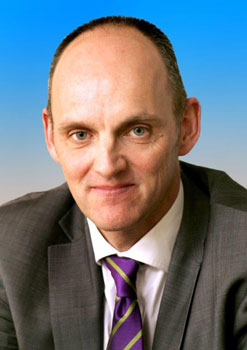A Herculean effort was now required to effect changes in the Irish health services at the scale and pace required, Dean Sullivan HSE Deputy DG – Strategy told a HMI Dublin Mid Leinster meeting in the Dublin Dental Hospital. Maureen Browne reports.

Speaking on “Health and Social Care in Ireland – Some Initial Observations,” he said that at present hospitals were struggling to respond to demand for scheduled and unscheduled care and community services were underdeveloped in the context of their roles – they were not resourced either to deliver the services required today or those required for the future. There was a significant unmet need across different sectors, delivery arrangements were fragmented geographically, sectorally and across boundaries.
“Access to health care is unequal, we have difficult workforce issues, major financial challenges and a failure to meet public expectations.”
Mr. Sullivan said that Sláintecare presented a compelling way forward. It spoke about a modern, responsive integrated public health system, with care planned and provided around the need of patients, a system where care was provided on a timely basis and free at the point of delivery, where care was accessed in appropriate settings, there was an appropriate supported and valued workforce, appropriate public funding and effective governance.
“There will be a strong focus on a public health system in which we value our workforce and where we use public money well and have a system where there is governance and alignment.”
There has to be a game changer somewhere there around population health and if we can harness GPs and primary care then we might help to turn the tanker.
Mr. Sullivan said there was a vast amount of fantastic work happening in the Irish health services, both within hospitals and within community health organisations.
“But we have opportunities to do things better. There are opportunities for more effective integration and coherence, quantification of desired aims and objectives, robust prioritisation to deliver these and a greater focus on implementation vs. design. Herculean efforts are required now to effect change at the scale and pace required.
“We are less strong on implementation than strategy and design. I believe we can make progress with the issues facing us, but it will need a very considerable amount of work.”
Mr. Sullivan said that most of our focus was on the new monies coming in every year rather than focusing on the money already in the system.
“Action needs to be taken based on robust data and evidence and there is something of a dearth of data to underpin what we are trying to do.
“Our key reform themes as set out in the National Service Plan 2018 are to improve population health, deliver care closer to home, develop specialist hospital care networks and improve quality, safety and value. There is nothing in SláinteCare that is inconsistent with this.
“A lesson I learned working in Northern Ireland is that we need to build capacity at primary and community level and this will be a key focus for us going forward.
We need a strong lean national HSE centre, with responsibility for strategy, planning and standard setting, one more equipped to lead and oversee, than directly to control and deliver
“Population health is an area of key opportunity for us and if we don’t find a way to improve this, our time will be spent every day on trying to deal with unrelenting unscheduled care pressures.
“There are probably not enough resources across government to fund all we would need for additional hospital capacity in an unreformed system, so there has to be a game changer somewhere there around population health and if we can harness GPs and primary care then we might help to turn the tanker.”
Mr. Sullivan said hospitals should be reserved for very short periods for very specialist levels of care. Patients should not be referred to hospital who could get their treatment elsewhere, older people should not be sent to hospital unnecessarily if our key objective is to have them live at home as long and independently as possible.
“The flip side of this is that our hospitals are too distributed and too diverse to develop specialist hospital care. There will need to be a degree of aggregation of some key services. We know that is the direction we have to take, that is the way the trauma service review is taking us. We must ensure an appropriate focus on quality, safety and value.”
Turning to the need for structural reform, Mr. Sullivan said we need to move away from a command and control model to one that supports and enables a strong flexible and responsive delivery system. We need a strong lean national HSE centre, with responsibility for strategy, planning and standard setting, one more equipped to lead and oversee, than directly to control and deliver.
Delivery organisations with appropriate autonomy and clear reporting structures, operating as part of the national health service with overall national policies, standards and robust delivery structures are essential to long term success in his opinion.
“In conclusion there is much good work to build upon in the services and there are also huge challenges, SláinteCare is an excellent foundation for moving ahead and there is a need for commitment, support and alignment at all levels.”

